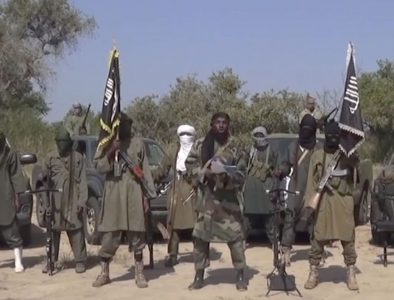
Boko Haram adopts hearts and minds strategy in Nigeria inspired by ISIS terrorist group
When a motorbike convoy of Boko Haram fighters invaded Baga in north-east Nigeria last December, residents feared the very worst. Watching the gunmen roll in, they recalled Boko Haram’s last seizure of the town in 2015, when hundreds of their men were slaughtered and their women kidnapped as “bush wives”.
This time, though, the Hells Angels’ style motorcade did not bring the usual orgy of rape, murder and pillage. “They didn’t beat anyone, they just said that we should stay where we were,” said Mansour Yusuf, 44, a father of nine. “But they also said we were free to leave if we wanted to.”
Mr Yusuf took no chances, fleeing along with thousands of other Baga residents to the better-defended town of Monguno, where Nigerian troops have dug a protective trench around the town.
That he is alive to tell the tale, however, does not speak of any new tender-heartedness on Boko Haram’s part. Instead, the “hearts and minds” strategy is all part of the long-term game being played by the new Isil-allied faction of Boko Haram.
Known officially as Islamic State’s West Africa Province, or ISWAP, the group has gained a firm foothold in the past year, confounding claims by President Muhammadu Buhari that the insurgency is facing defeat.
Focusing on military rather than civilian targets, they have mounted devastating, well-organised attacks on isolated army bases, including one last November in which up to 100 soldiers died.
The group declared fealty to Isil in 2015, splintering from the rival Boko Haram faction led by Abubakr Shekau, the man notorious for the Chibok schoolgirl kidnapping in 2014.
While Shekau revelled in indiscriminate brutality – he boasted of slaughtering people “like chickens” – ISWAP has tried to build turf by courting rather than cowing the civilian population.
Massacres of entire villages have been avoided, as has the use of women and children as suicide bombers. To sweeten the pill of its religious dogma, it tries to present itself as a force for equality and social justice.
“When they came into Baga, they promised that they would take the food stocks from all the influential men in the community and share it with us,” said Abdullahi Mohammed, 42, another fisherman who fled to Monguno. “They said: ‘the government does nothing for you, we are here to relieve your suffering’.”
There are limits to the group’s charm offensive, however. Captured soldiers and civilians suspected of spying can still expect torture and execution. Last year, the group also kidnapped and murdered two Nigerian Muslims working as nurses for the Red Cross, describing them as “apostates”.
One man in Monguno showed the Telegraph an ISWAP propaganda video, showing two relatives who had been kidnapped by the group during the attack on Baga. “They were working for the civilian joint task force (an anti-Boko Haram vigilante group,” he said. “They’ll probably be killed now.”
Just how close ISWAP’s links are to Isil’s core leadership in the Middle East is unclear: most experts doubt it gets much logistical help. But with Isil now in disarray in both Iraq and Syria, Nigerian army commanders claim that foreign jihadists are already swelling its ranks.
“We have battle encounters where some of the corpses we have seen on the ISWAP side have been either white or North African – I’ve seen a couple myself,” one senior Nigerian army officer told The Telegraph. “There seems to have been influx of non-locals into this sect, and we think it may account for some of the ambitious attacks they have carried out.”
Mr Mohammed and Mr Yusuf now live in tents in a vast aid camp in Monguno, along with nearly 150,000 other people made homeless by the crisis. Many have fled towns that the Nigerian army had previously declared safe.
Source: Telegraph





